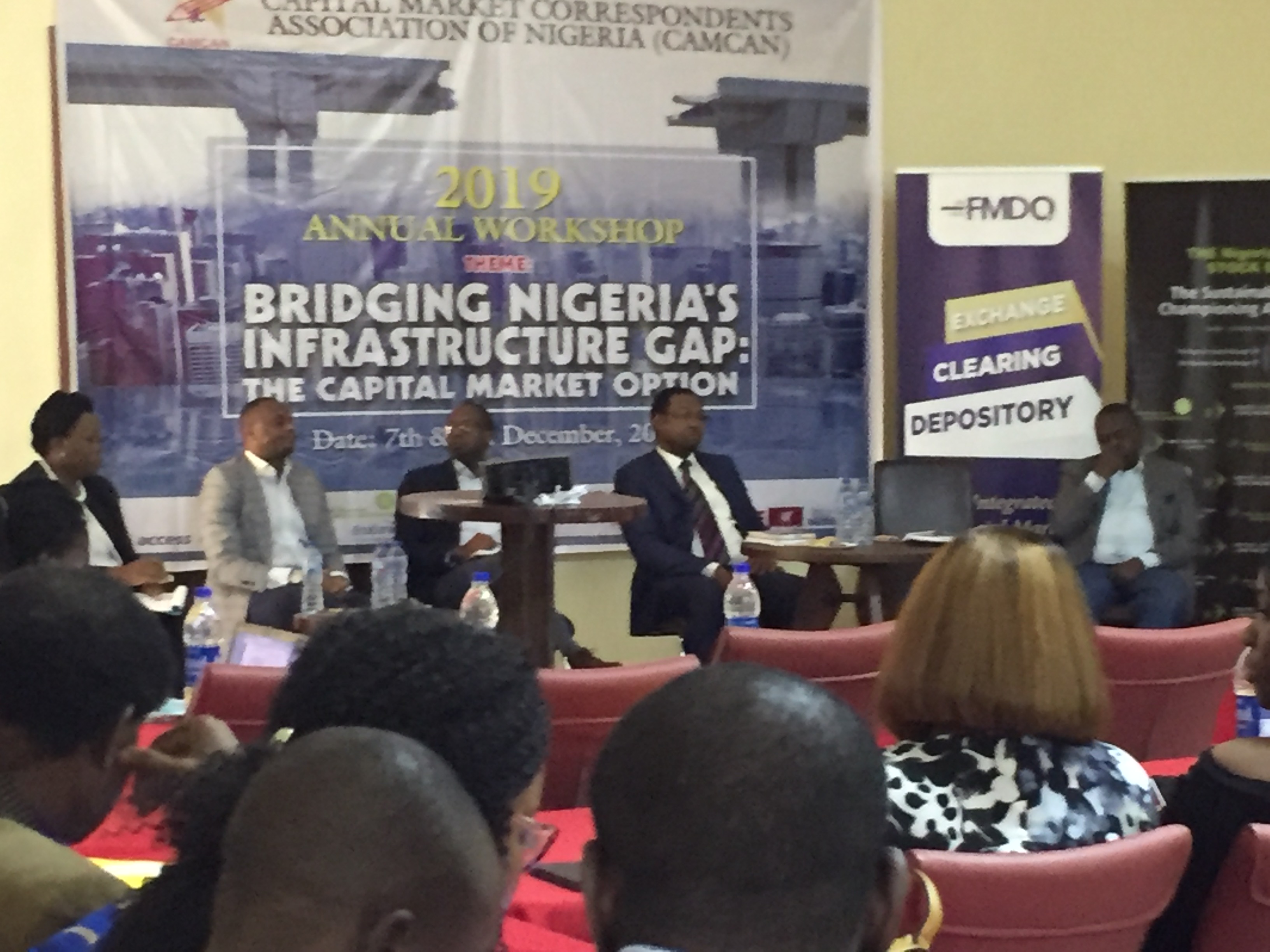Political risks and the absence of adequate policy framework have been identified as some of the factors militating against infrastructure development in Nigeria.
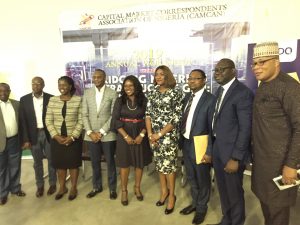
According to Financial Experts and stakeholders who deliberated on the subject over the weekend, an All-inclusive Macro-economic and strategic plan is critical if the country will attract investors to long-term domestic projects in Nigeria. They call on government to review its funding policies for infrastructure development in the country.
In a presentation titled “Bridging Nigeria’s infrastructure Gap, the Capital Market Option”, Investment banker and Head, Debt Capital Markets, FBNQuest Merchant Bank Limited Oluseun Olatidoye explained that the Nation’s Capital Market by design is positioned as a platform where funding for infrastructure development can be accessed going by some landmark transactions in over the years.
He was speaking at the just concluded annual conference of the Capital Market Correspondents Association of Nigeria (CAMCAN) which came up at Dover Hotel Lagos.
In recent times, the Market has funded the re-construction of portions of over of 25 roads across the six geopolitical zones in the country with the sum of N200billion derived from Federal Government bonds such as the FGN Sukuk bonds.
“We have raised N11.4billion for the development of primary, middle and secondary schools facilities in Osun State, we have funded the development of affordable housing on the Mixta Real Estate Plc Bond Issues and we have developed a number of roads, bridges, health facilities using the opportunity presented by the capital markets,” he said.
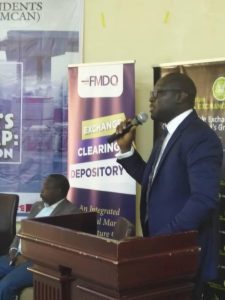
Olatidoye says in order to successfully tap into the capital market for infrastructural financing, the existence of sound macroeconomic and policy frameworks are pre-conditions, hence, freedom must be given to market forces to take its course. This according to him is key considering the huge financial outlay that runs into trillions of Naira, needed to bridge the gap.
“As much as the government has its role, political interference must be limited. This insures investors against any form of political risk, and most importantly corruption which has the potential of crippling the entire endeavor”.
He noted that foreign capital was a big deal in the domestic debt capital market, adding that it is pertinent to note that project bonds, Sukuks, and other infrastructure-based fixed income products may be unappealing to foreign interest for a couple of reasons.
“Top of such concerns include: foreign exchange policies, liquidity, and tenor (money market has been the major destination for foreign portfolio investors).
Olatidoye ‘s presentation also highlights the need for Government to mitigate against risk factors by implementing macroeconomic policies that foster stability and direction. This according to him is key to capturing offshore investors in long term domestic projects. Especially as foreign exchange volatility, if not addressed could go a long way deterring the interest of foreign counter parties.
“Depending on the structure of the bond, projects could be of a nature that exposes the financers to devaluation risks, which will whittle down the dollar value of local currency cash flow from such projects. Hence, may fail to service the debt (especially if denominated in the dollar).
Moreover, investors will be wary of rating characteristics of the issue. As it is often the case for government-sponsored issuances where the state’s creditworthiness influences the rating of its issue or special purpose vehicle (SPV).
“Ultimately, if infrastructure funds are the preferred options for issuers, the ingenuity of financial advisers would be put to test in coming up with structures that protect investors from currency fears (assuming the status quo remains) and also meeting the rating criteria,” he said.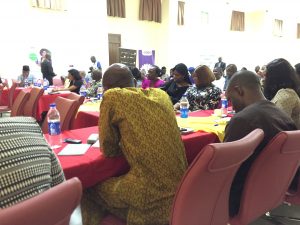
Oladitoye noted that regulators have the principal onus to educate the investing public and other capital market participants.
“This forms the starting point of extracting the most benefit from an efficient capital market. Also, adequate market infrastructure should be in place to promote transparency (for instance, developing a whistleblowing policy), and address potential cogs from the issuance process to trading, settlement or rollovers.
As an incentive, the overall cost related to pre-issuance, issuance and post-issuance activities can be should be revised downwards. Specifically, a favourable tax regime should be instituted for infrastructural investments,” he said.
However, Isioma Lawal Head, Internal Control Central Securities System (CSCS) argues that Nigerians also have a role to play in the journey to achieving infrastructure development. According to her, investing in the capital market is a sure way to get involved as the CSCS is positioned to help the investor participate in the Capital Market in a more convenient and efficient way. According to her, it is the responsibility of the CSCS to boost investor confidence whether foreign or local.
‘’ I look at Nigeria’s infrastructural problem, irrespective of the figures as the numbers keeping flying high, and Capital Market is where you can get long term funds to do this. However, should we wait for the government? You and I can do our bit by contributing to the Capital Market. The question a lot of us ask ourselves is ‘why should I invest in the Capital Market’. I have to be sure I will get adequate return.
Another member of the panel Jude Chiemeka, Head, Trading Division of the Nigerian Stock Exchange went on to buttressed the fact that infrastructure development is not just a Nigerian factor, but rather one that cuts across Africa. According to him it is about what government is willing to do and how far it is ready to go in order to achieve its priorities.
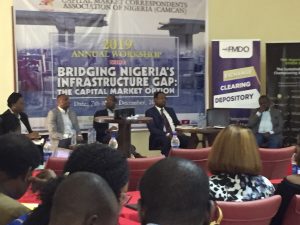
‘’Today, we have oil revenues that will not meet the funding gaps, we have budget constraints that will not fund this gap. So Government in itself, will not and cannot fund the gap, and so it is important for them to quickly recognize that and begin to seek for partnerships from the private sector.
”It is the private sector truly that will provide the funding required. What government has been doing is that they have been borrowing and they have been mismatching their borrowing. They have borrowed so much locally now that even the local industries are not able to borrow because Government is borrowing on a monthly basis. ‘’
Nigeria’s debt accounted for 16.1 % of the country’s Nominal GDP in Dec 2018, compared with the ratio of 16.2 % in the previous year. The data reached an all-time high of 80.5 % in Dec 1992 and a record low of 7.2 % in Dec 2008. Nigeria’s National Government Debt reached 70.9 USD bn in Jun 2019 while the country’s Nominal GDP reached 123.4 USD bn in Sep 2019.
According to Chiemeka the NSE has positioned itself to foster government’s partnerships with the private sector as it will go a long way mitigating against the devaluation of the Naira with the necessary frameworks in place.
Emmanuel Etaderhi however spoke on the question of political risk as a major point of reference for prospective international investors sighting the Lagos – Ibadan express way as a typical case for reference.
According to him, political risk is one of the reasons why investors shy away from investing in Nigeria’s infrastructure development. He emphasized on the need for Government to demonstrate to the people a stronger will to resolve the problems.
‘’ If you do time travel say forty years back, we have been saying the same thing with no meaningful progress. So we itemize these problems, identified these products and even articulated our position to the regulatory authorities as to how we can use policies to drive the growth of the market.
”We have position papers with different MDAs and governments on some of the issues that have been mentioned. Issues about the expiration of the tax window, the waiver for 2022. There is a mounting trepidation in the hearts of investors, what is going to happen post 2022. It was a ten-year waiver given by the Jonathan government, and nobody knows what is going to happen in 2022.’’
According to Etaderhi, the FMDQ has written a position paper asking the Federal Government to either extend the policy for another ten years or if that window will be closed, the FGN Bonds should not be the only ones that will enjoy the window, equalize it.’’ He says, this is key to sustaining the corporate bonds market.
In March 2010, the Federal Government through the Debt Management Office announced the approval by the Federal Government of Nigeria to grant tax waivers for all categories of bonds (including corporate bonds) and short term government securities such as treasury bills.
With the expiration of the waiver just around the corner, financial experts urge the Federal government to review all position papers advocating for either an extension or a review that will go a long way enhancing the nation’s corporate bond market.

